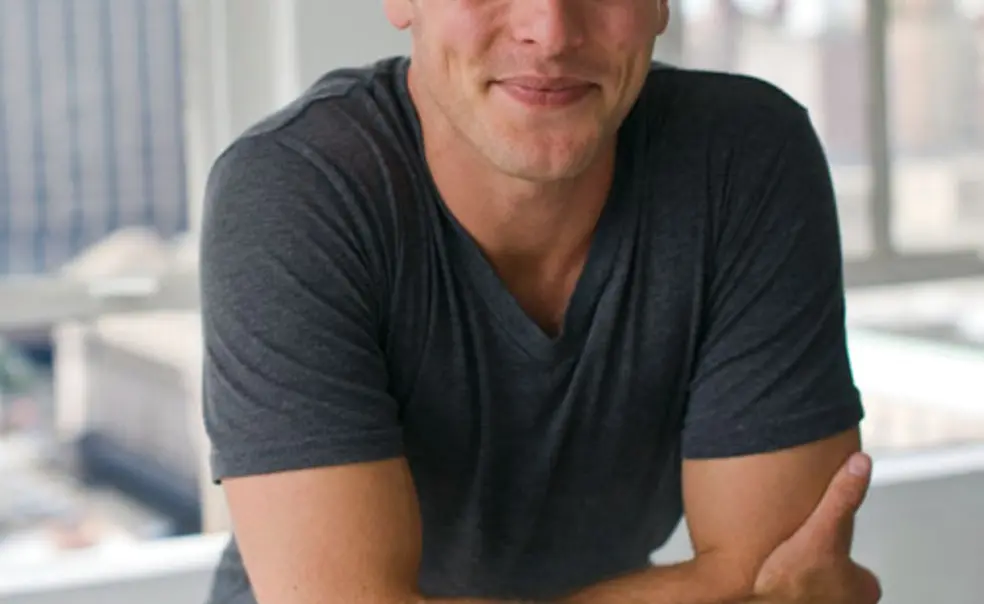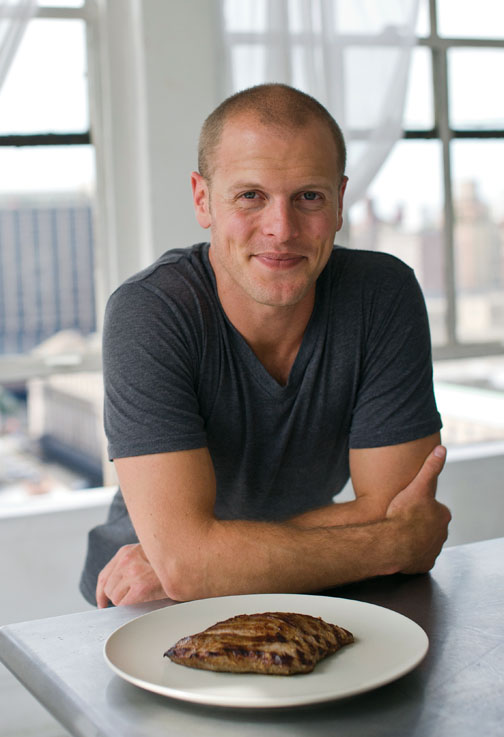Tim Ferriss ’00, on cooking and field-dressing a deer
Tim Ferriss ’00 is many things: polymath, innovator, nutrition and fitness guru, prodigal self-promoter, and self-described “human guinea pig” who will try just about anything in pursuit of the good life. In everything, he seeks to find the secret, quick route to an achievement that for most people would require tedious, grinding labor. He’s no snake-oil salesman, but he’d probably be willing to drink some snake oil just to test whether it could help tone muscles, sharpen memory, or add some tang to a salad dressing.
Ferriss, author of three books, vaulted to fame with his 2007 best-seller “The 4-Hour Workweek: Escape 9-5, Live Anywhere, and Join the New Rich.” His new book, “The 4-Hour Chef: The Simple Path to Cooking Like a Pro, Learning Anything, and Living the Good Life,” includes instructions on purchasing “survival gear” like “tarps, traps, and tactical knives” along with recipes and advice on kitchen supplies. Ferriss abandoned traditional publishing houses to sign a seven-figure deal with Amazon, saying he wanted to work with a “technology company trying to innovate publishing” by selling directly to customers. As a result, many retailers won’t carry the book.
PAW spoke with Ferriss shortly after the book’s publication in November.
How do you describe yourself?
I aspire to be a very good teacher, first and foremost. And part of that is becoming a very immersive student. So I have incredible respect for people like George Plimpton, who was doing the types of things that I do long before I was doing them. ... On the teaching side I really aspire to be like Richard Feynman [*42] — an incredible physicist, but he was also a polymath and became expert at playing the bongos and learned to safe-crack while at Los Alamos.
The 4-Hour Chef seems to be a cross between Julia Child and The Boy Scout Handbook, with some Esquire magazine thrown in.
I have been describing it as a cookbook for learning disguised as a cookbook for food. My readers have been asking me for a book on deconstructing skills and accelerated learning. Becoming a master student — doubling, tripling your learning speed, regardless of subject mater — is really the bedrock upon which everything else rests.
Your audience is largely male. Is there a particular challenge for men these days?
I do think that men are very confused about their function, their role in modern life. I think a lot of men feel like sperm donors, and a lot of women are very explicit about how men are effectively optional. When men do not have vehicles for, one, feeling valued; and two, using the hard wiring and testosterone that — like it or not — they have as their makeup, problems can crop up. Not that we have to revert to being Paleolithic or anything like that, but at the end of the day, we are social animals in very fancy clothing.
You’ve got some blood and guts in the book, literally, where you kill a deer and field-dress it. Why did you include that?
I wanted to tell the story of the anti-hunter’s first hunt. ... I ran into a bit of a moral dilemma because, in the “wild” section of the book, I wanted to force myself to reconnect with all of the ingredients that I use, and to procure all of my ingredients outside a supermarket, whether that be foraging or hunting. I want people to be aware of where their food comes from.
The way I treat the term “chef” in the book is not limited to the kitchen. What that means is making people feel like the director in their lives, not a spectator. That comes down to self-reliance. I think it is a wonderful confidence to have — an ability to be self-reliant.
You’ve talked about “decision fatigue.” How is that relevant?
Decision fatigue is a major problem in a digital world where people are put into a reactive moment from the first moment they open an email or walk into a supermarket and have to choose between 100 brands of toothpaste. Modern society is in a constant state of low-grade anxiety. When you combine that constant input with the lack of physical results from work, when you close your laptop at the end of the day and you have nothing physical to show for it, that’s a recipe for anxiety and unrest.
— Interview conducted and condensed by Joel Achenbach ’82













1 Response
Jack Alven
8 Years AgoI really enjoyed this...
Great. I really enjoyed this resource, thanks.